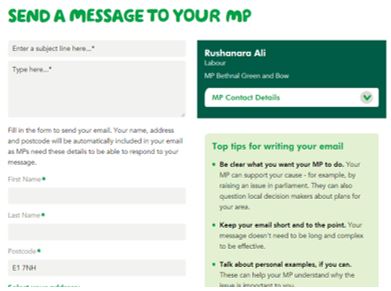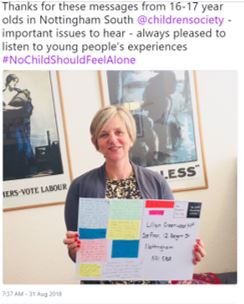Whether you are just starting out email campaigns with MPs, or if you’ve been doing it for years and want a refresher, here are some tips from our latest research with MPs, including examples we have seen of the different ways to approach email campaigns.
1. MPs say emails are the most frequent way they are contacted by charities
In 2017 we asked MPs about the most frequent ways that they have come into contact with charities; emails were by far the most frequent way that MPs were contacted. This makes sense as it is an easy way for charities and charity supporters to contact busy MPs, particularly when other options such as face-to-face meetings can be hard to get in the diary, and events and receptions can take a lot of resources to organise.
But as MPs receive lots of emails how can charities make this contact as effective as possible?
2. Sometimes less is more
Although MPs receive a lot of emails, this does not automatically mean that emails can’t be influential. In fact, when we asked MPs if they thought email campaigning was an effective way for charities to influence their work, 41% of MPs agreed.
However, for MPs who didn’t find email campaigning influential, some said that it was because they couldn’t get a sense of how important a campaign was to the individual constituent that sent it, and because of a high volume of emails this often resulted in the MP sending a stock response back.
“It is too easy: one doesn't really know how important it was to the constituent.”
– Conservative MP
With this mind it is important to consider how you can make your communication with MPs as effective as possible, particularly with groups of MPs who are less receptive to email campaigns.
It is worth considering what you want to achieve with an email campaign – will the volume of emails help you show support for an issue in a constituency? Or would personal emails from a few supporters be more effective for certain campaigns? Depending on your campaign, a smaller amount of emails could be more effective at getting an MPs attention.
3. Think of ways you can help supporters to tailor emails
In our research, MPs often mentioned a preference for tailored emails. If you have decided that more personalised emails from supporters could be a more effective way of achieving your aims, thinking of ways to help supporters write emails that link in with your campaign can be helpful. Is there an easy way that you can help supporters to tailor emails to their MPs?
“Make it more personal to the constituency and have less of a suggestion that MP knows nothing about it or haven't done anything on this already.”
– Labour MP
There are some great examples of charities helping their supporters to tailor emails based on their constituency. One example is Macmillan who include local statistics and tips on what to include in an email through their platform.
Image 1: Macmillan's email template for supporters to send to their MP
4. Consider whether to include key asks or invites
Sometimes a high volume of emails can be an effective way of showing how much support there is for an issue. Our research showed that 1/3 of MPs agreed that email campaigns were likely to get them to take action. For these MPs that are likely to act, they mentioned the importance of specific asks such as a constituent asking them to attend a debate or an event.
“Be direct as to what they want me to do e.g. write to a certain minister.”
– Labour MP
5. For most MPs, lots of emails are still more popular than postcards
Before email campaigning, sending postcards used to be a common way for charities to mobilise their supporters to contact their MP. Anecdotally, we have heard that some organisations are returning to this method. We were interested to find out whether MPs had different views towards postcards compared to email campaigns.
Half of MPs (53%) agreed that they would prefer to receive multiple emails from constituents instead of receiving multiple postcards on the same issue. This compares to 23% of MPs who disagreed.
Despite this preference, there have been some interesting ways that charities have been using postcard campaigns. The Children’s Society combined handwritten messages from young people in MPs’ constituencies onto one big postcard, making sure that the messages got to MPs whilst also creating an interesting photo opportunity.
Image 2: An MPs’ twitter post about postcard received from the Children’s Society
Charity email campaigns are likely to remain a fairly divisive method of getting MPs’ attention; but if you keep in mind personalisation, calls to action, and give some thought to the volume of emails you ask your supporters to send, you may see better engagement from MPs.
If you have examples of effective email campaigning, we would love to hear about it so please comment below.
If you want to find out more about our research with MPs and our Charity Parliamentary Monitor please visit https://nfpsynergy.net/tracking-research/charity-parliamentary-monitor or contact cpm@nfpsynergy.net



